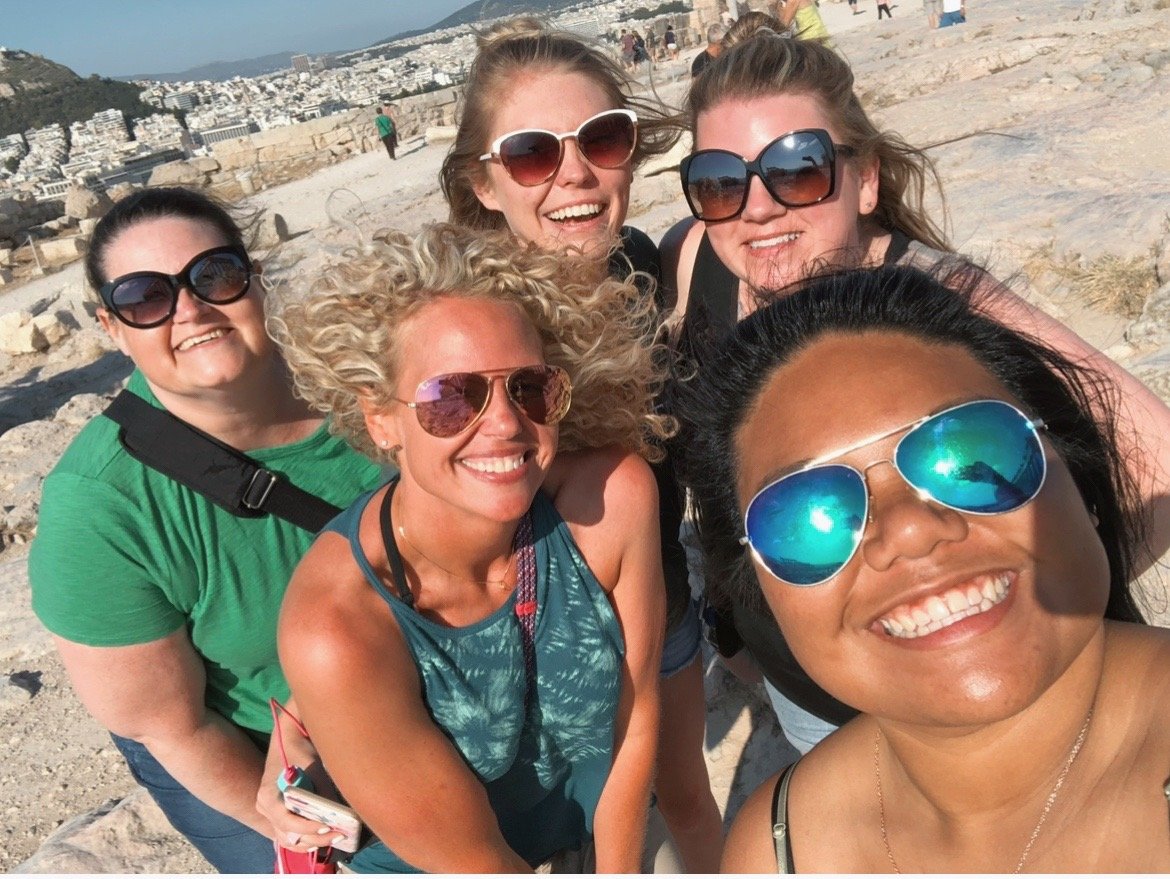Group travel often gets a bad wrap. There are so many misunderstandings surrounding it.
I often hear reservations like, “I value my freedom too much to travel with a group,” or “I would, but it costs too much!” I was a huge skeptic myself before I dipped my toe in the group travel world, but let me tell you, it was a GAME CHANGER.. And in all the best ways. I found myself questioning how it had taken me so long to discover the wonderful world of group travel.
I’m here bust a few myths surrounding group travel and let you know some of the top ways it will actually enhance and benefit your travels to travel as a group.
Reason #1: Shared Experience
Group travel provides an opportunity for people to connect and bond with one another. Shared experiences create memories that are unique to the group, fostering a sense of camaraderie and friendship among the travelers, many of whom start out as strangers.
I’ll never forget returning from my very first trip abroad and beaming through my jetlag to recount every single magical moment I had experienced on my adventures in Eastern Europe. By the second -or third shepherd reference, my well-meaning, but totally-disconnected-from-my-experience mother’s eyes sort of glazed over into a polite, but impersonal gesture of thats-nice-but-I-couldn’t-really-care-less. Nothing is quite as defeating as coming home from a life-altering experience, willing and eager to share the magic that you learned, only to find a not-so-enthusiastic audience. They weren’t there with you and they simply don’t get it. It can feel very isolating.
With group travel, you have the bond of sharing your life-altering experiences with several people. You can reminisce and connect over your memories together for years to come.
Reason #2: Enhanced Safety
Traveling in a group can increase your safety in several ways. A group of people is less vulnerable to potential threats compared to an individual. Criminals are less likely to target a larger group, as they tend to look for easier targets. Additionally, when you're part of a group, you have people you can rely on in case of emergencies or unexpected situations.
I know with Land + See, one of the unspoken perks of our groups is we often have many medical professionals that tour with us. I’ll never forget seeing a man collapse on a ferry to Santorini and watching Dr. Tony spring into action! We have been so lucky than none of the medical mishaps have happened to our travelers, but there have been more than one occasion where our heroes have saved the day. It definitely gives me peace of mind knowing we are in such good hands.
Whether it's a medical issue, getting lost, or running into difficulties, having others with you means there are people to help and support you.
And lastly, traveling with others can provide emotional support and reduce feelings of vulnerability, especially in unfamiliar or challenging environments.
I’ll never forget a particularly tearful, but supportive afternoon in Austria where a female traveler and I completely bonded over our past. I haven’t seen her for years, but I am confident if I picked up the phone tomorrow she would be by my side in an instant, and vice versa.
Reason #3: Cost Savings
Group travel allows you to have a custom-tailored travel experience at a fraction of the cost of solo travel. When you travel with others, you can split the costs of various expenses, such as accommodation, transportation, and food. Sharing these costs can significantly reduce your individual financial burden without compromising on quality.
I’ll never forget my first group travel experience as an adult. Jordan and I had traveled to Paris with his family just the year before so I naively assumed I’d already “seen what there was to see” on the re-visit a year later. How wrong I was. Because we were with a group we had the means to have a private driver on call for us and hire private local guides to show us the city through their eyes. Our Parisian guide, Mario, made the city come alive for me—as if I was seeing it for the very first time. The history, the art and the culture started to feel like it was a part of my own narrative. I simply hadn’t experienced anything like that when I was visiting on my own. While I was a tourist, my experience wasn’t just that of a tourist—I had someone showing me their personal favorite places off-the-beaten-path, translating what certain looks or gestures meant to true Parisians, sharing anecdotes and stories of his family and personal meaningful details of the places we would go—sometimes exposing unflattering or comical aspects and leaving me with a plethora of inside jokes and fond memories. This magic didn’t just “happen,” we were able to afford a much richer experience because we were splitting the cost with so many other participants. Hiring Mario would’ve been intangible on a single traveler’s budget.
Group bookings often come with bulk discounts for things like flights, hotels, guides and tours, and the reasons make sense. Travel providers are more likely to offer better deals when they know they have a large group of customers. Additionally, by sharing a hotel room or vacation rental with others in the group, you can split the cost of the room, leading to substantial savings compared to booking a single room for yourself, helping you keep costs low or allowing you the wiggle room to indulge in something a little fancier than you might be able to afford on your own.
Whether you’re hiring a guide or renting a vehicle or bus, splitting the costs among group members can make these services more affordable for everyone and they definitely make a tangible difference in the quality of your travel experience.
Reason #4: Diverse Perspectives
Traveling with people who have diverse perspectives can be immensely beneficial in several ways. For instance, interacting with people from different cultural backgrounds allows you to gain a deeper understanding of their customs, traditions, and ways of life. This exposure can help break down stereotypes and promote empathy and respect for cultural diversity. You may encounter a variety of perspectives, not only with the locals you interact with, but within the dynamics of the group itself. Traveling with individuals who see the world differently than you do can open your mind to new ideas and ways of thinking.
I’ll never forget this amazing dinner we had in the home of Albert and Bergthor in Reykjavik, Iceland. Albert is a world-reknown opera singer, and Bergthor is a chef. Together we spent an incredible evening learning about Iceland, equality, naked grandpas and how to do the coolest new dance moves. I hesitate to admit this, but had we known ahead of time that Albert and Bergthor were a same-sex couple, it’s possible we would’ve had some preconceived ideas about what we would experience, but by allowing that wall to come down and meet them on a human level first, it challenged our bias and taught us valuable lessons in humanity.
Diverse perspectives challenge your assumptions and encourage you to question your beliefs, leading to personal growth and intellectual enrichment. By experiencing diverse perspectives firsthand, you are more likely to develop a sense of tolerance and acceptance for people who are different from you. This fosters a more inclusive and harmonious society and quite simply makes the world a better place.
Reason #5: Stress Reduction
Traveling with a group and having a full-time group leader can indeed reduce stress in several ways. The most obvious way, is with the addition of a group leader.
With a group leader in charge, you don't have to worry about planning the itinerary, booking accommodations, arranging transportation, or managing logistics. The group leader takes care of these tasks, ensuring a smoother travel experience for everyone. A group leader can be experienced in handling various travel situations, including emergencies. Their knowledge of the destination and local customs can enhance safety and security for all group members, reducing individual stress related to unfamiliar environments. And lastly, in regions where language or cultural differences may be a challenge, having a group leader who is familiar with the local language or customs can facilitate communication and create a more enriching travel experience.
When you travel, things happen—it’s just the nature of travel. Don’t let the stress of the unknown fall on you to figure out. Join a group that has a knowledgeable and competent group leader that knows what their doing and has a proven track record.
No one wants to spend their vacation time putting out fires. When you envisioned this trip, you saw yourself lounging by the sea, eating gelato, and exploring to your hearts content. Group tours allow you the freedom and flexibility to enjoy your vacation, so you don’t come home needing a vacation from the vacation.
Obviously this isn’t an exhaustive list of all the benefits to group travel, but it at least gives you a small taste of the some of the top ways that group travel can enhance and even improve your travel experience.
I know there are a lot of misconceptions circling about the realities of group travel, but chances are, if you ask someone who’s tried it, you will learn that the benefits far outweigh the risks.
Take it from me, the biggest former skeptic of them all–take a sip of the group travel Kool-Aid. Not only does it stand a great chance of whetting your travel appetite, you may just find that fully immersing yourself in the culture without the stress and worry of coordinating it all, is your new “thing.”
Happy travels, friends!

















